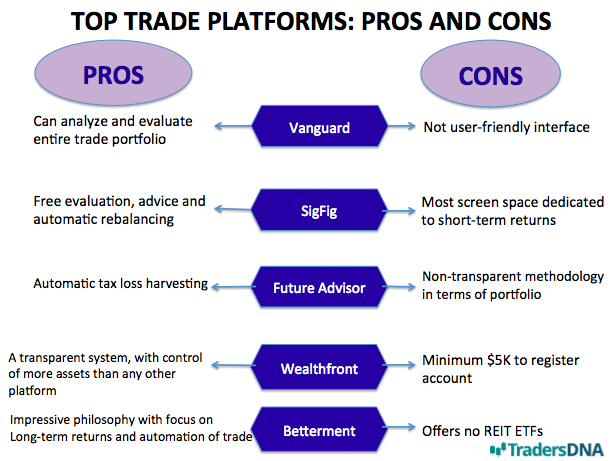When you talk about investment and trade platforms, it is important to do a comparison in terms of each vendor’s advantages and disadvantages. A good trading platform serves as a pinnacle for maintaining and balancing your trading portfolio, not to mention it also aids you in keeping your funds reinvested, offering services at reduced prices. This is especially important to consider if you have your holdings divided in various brokerages and accounts. The famous John Bogle once said,
“When there are multiple solutions to a problem, choose the simplest one.”
Managing your investment and trading portfolio using a computer is just not simple, but it’s smart as well and it can potentially increase your investment returns. Mentioned below are four of the best trading platforms with their respective pros and cons to help you decide which one(s) you should choose. So, here goes a summary of the best platforms with the details presented further below:
Vanguard
Pros
- Amazingly reduced fee index ETFs along with mutual funds that don’t include a commission fee
- Provides the benefit of automatically reinvesting your dividends
- Useful online trading tools that can help you analyze and evaluate your entire trade portfolio which also includes external accounts as opposed to the broad market
Cons
- User interface is not so user-friendly and might end up feeling bulky
- Takes too long to transfer funds and switch between trading accounts in comparison to other platforms
- Moving money and rebalancing your portfolio takes a bit of a manual input which does take considerable time especially if you’re managing multiple accounts
- You will receive a lot of duplicative email pertaining to your accounts with Vanguard which can be really annoying
2. SigFig
Pros
- SigFig is indeed a promising platform that has an interesting user interface with attractive visualizations
- You can select from two different options, namely free evaluation and advice and automatic rebalancing at a fee of $10 per month
Cons
- Although there is no doubt about the beauty of its interface, where it lacks is functionality. The interface feels too traditional when used and appears to emphasize on short period returns
- Constant emailing can be irritating
- A lot of screen space dedicated to short-term returns and real estate
3. Future Advisor
Pros
- A pleasant user interface
- FutureAdvisor also provides a view of all your investment which you are holding in different accounts
- Offers two different accounts, like SigFig
- Automatic tax-loss harvesting
- FutureAdvisor enhances your current holdings (in contrast to liquidation and reinvestment)
Cons
- Because of the fact that FutureAdvisor altered its models a couple of times over the years, it also charges an account management fee which is 0.5% more than other providers
- A lacklustre customer support system, you may or may not get a reply from them pertaining to a query, complain and or an enquiry
- Irritating emails about short-term profits
- A non-transparent methodology in terms of your portfolio
4. Wealthfront
Pros
- A visually pleasing interface, not to mention easy to use
- Offers different portfolios for both IRA and other taxable accounts
- Provides free management of your first $10k
- Automatic tax-loss harvesting which can be useful for investors
- Wealthfront has control of more assets than any other provider mentioned here
- Reduced fee (0.25%)
- A transparent system
Cons
- For $100k accounts, the fee charged is higher compared to other packages
- Minimum of $5k to register an account with Wealthfront
- You have to create your account first in order to look at their internal interface
5. Betterment
Pros
- A good website design and smart user interface
- Depending on the type and size of your account, you can enjoy reduced fee up to (0.35% to 0.15%)
- You can also choose to invest in fractional shares
- Betterment ranks 2nd of the platforms in terms of number of customers
- A transparent portfolio style
- No initial deposits
- Impressive foundational philosophy with a focus primarily on long-term returns and automation of trade
- Offers automatic tax-loss harvesting
- As of 20th of July this year, Betterment also offers an enhanced bond mix for accounts which are taxable for example IRA accounts
Cons
- Betterment offers no REIT ETFs
All in all, these are five of the best platforms with their pros and cons to help you select the one that suits your needs the best.
Tradersdna is a leading digital and social media platform for traders and investors. Tradersdna offers premiere resources for trading and investing education, digital resources for personal finance, market analysis and free trading guides. More about TradersDNA Features: What Does It Take to Become an Aggressive Trader? | Everything You Need to Know About White Label Trading Software | Advantages of Automated Forex Trading






































